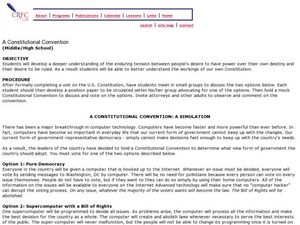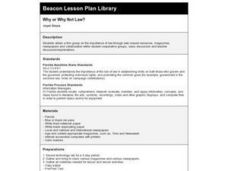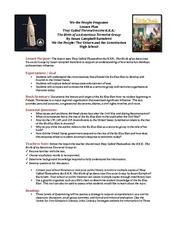Curated OER
A CONSTITUTIONAL CONVENTION: A SIMULATION
Students discuss two computerized options to change the current U.S. government. In this Constitutional Convention lesson, students write a statement advocating for one of the choices and participate in a mock modern Constitutional...
Curated OER
Utah's Legislative Branch: How a Bill Becomes a Law
Seventh graders explain the steps by which a bill becomes a law. They research how a bill becomes a law within the three branches of Utah's government and synthesize their research and discussion in a classroom representation of government.
Center for Civic Education
What Is Authority?
Young scholars examine the concepts of power and authority as they begin learning about government in this elementary social studies lesson. Through a series of readings, discussions, and problem solving activities, children...
American Bar Association
What Is Separation of Powers?
Who has the power? Scholars investigate the creation of the three branches of government in the United States Constitution. They analyze just why the framers created the branches the way they did.
Curated OER
Blasphemy! Salman Rushdie and Freedom of Expression
Students explore the concepts of blasphemy, censorship and freedom of expression through the lens of Salman Rushdie. They also consider how these issues have been reflected in US history.
Heritage Foundation
The Powers of the Executive
Are executives as powerful as they sound? High schoolers find out about the US president and executive branch. A variety of activities include scaffolded reading sections, research assignments, and collaborative group work.
National Endowment for the Humanities
Chief Executives Compared: The Federalist Papers
Delve into the responsibilities of the president by looking at President Hamilton's opinion of the presidential office in his own words. The second in a three-part series, the resource also offers an interesting compare-and-contrast...
C-SPAN
Judicial Review and Marbury v Madison
The Supreme Court case Marbury v. Madison may not be widely recognized but the landmark case is particularly significant because it established the precedent for judicial review and that the Supreme Court had power as an interpreter of...
Curated OER
What is Public Use?
Explore the Fifth Amendment by examining the meaning of "public use" as learners read a scenario and role play their assigned parts to determine "public use." They also read Supreme Court Cases regarding the amendment and present their...
Curated OER
The Called Themselves the K.K.K.; The Birth of an American Terrorist Group
How did Ku Klux Klan develop and flourish in the US? How did the government respond to acts of terrorism conducted by the KKK following the Civil War? How does the government respond to acts of terrorism today? This resource...
Teaching Tolerance
Parallels Between Mass Incarceration and Jim Crow
Is history repeating itself? A riveting lesson examines the parallels between mass incarceration in the U.S. and the Jim Crow Laws of the past. Academics review Jim Crow Laws and compare them to mass incarcerations of African Americans....
State Bar of Texas
Marbury v. Madison
Who has the final say in matters dealing with the rules under the United States Constitution? The case Marbury v. Madison brings to light the issue of judicial review. Learners investigate the Supreme Court's opinion in the case with a...
Curated OER
Chalkboard Challenge: Social Studies Online
If used as an independent review, this presentation could be a quick way for students to study U.S. History facts. Since it only presents a few simple facts, it would not be adequate for a comprehensive review, but a teacher could...
Friends of Fort McHenry
Privateers in the War of 1812: Soldiers or Thieves?
Do governments have the right to authorize individuals to perform illegal acts during times of war? Did the US government really employ pirates? Use the War of 1812 as your vessel to answering these questions through class discussion and...
Teaching Tolerance
Using Photographs to Teach Social Justice | Legal Action: The Supreme Court
A social justice activity focuses on the Supreme Court case Loving v. Virginia which struck down laws that prohibited marriages between African Americans and white Americans. The activity begins with class members examining a photograph...
EngageNY
Studying Conflicting Interpretations: Perspectives on Plessy v. Ferguson: Part 3
Scholars closely read Justice John Marshall Harlan's dissenting opinion in the Plessy v. Ferguson case, seeking to understand why he disagreed with the court's decision that racial segregation laws for public spaces were constitutional....
Curated OER
Citizenship Test: Principles of American Democracy, Questions 1-12
Prepare your English learners for their upcoming citizenship test with this presentation. Addressing common questions about the American government and Constitution, this slideshow could be a good study guide for students who struggle...
Curated OER
Making Binding Agreements
A verbal contract can be legally binding under the right circumstances. Upper graders are assigned verbal topics to study and present. They prepare and deliver a 2-3 minute talk about their topic. Each topic relates to an aspect of...
Curated OER
The First Amendment
In this government worksheet, students read the First Amendment to the United States Constitution before reading about the limitations of the laws. They answer 2 short answer questions about the freedoms, and write an essay on the back...
Curated OER
Know Your (copy)Rights
Students define public domain and provide examples of work in the public domain. They define copyright, provide examples of copyrighted materials, and state the procedure for securing copyright for their own work
Heritage Foundation
Courts and Judges
If the Supreme Court is so supreme, why do all cases not just start there? High schoolers learn why every case does not start at the Supreme Court as well as the importance of hierarchy in the US judicial system in the 11th installment...
Heritage Foundation
Congress's War Powers
Declaring war is not as easy as some may think. High schoolers learn about Congress's limits regarding war by reading important clauses in the US Constitution. Various independent and collaborative activities reinforce learning, making...
Heritage Foundation
The Senate
Do your learners struggle to understand the differences between the Senate and the House of Representatives? Help them develop an understanding of how the US Constitution's clauses affect the Senate's operations. A high-quality...
Other popular searches
- Constitutional Law Games
- Discuss Constitutional Law
- Constitutional Law Privacy
- Constitutional Law Jeopardy
- Constitutional Law Lessons
- Constitutional Law Cruel
- Constitutional Law Syllabus

























